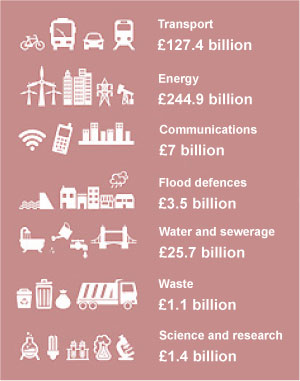2 Skills shortage – where will the jobs be?
Now is a great time to be returning to a career in STEM as employment opportunities at all levels are set to expand considerably. In the next section, you will read summaries of some UK government reports about its future strategies and investment plans. It’s an opportunity to think about where your existing skills and experience might be relevant and what new growth areas excite you.
The UK government has committed to an investment of £411bn between 2015 and 2020 in a range of infrastructure projects across England (Figure 2). The scale and scope of these projects will require skills across the spectrum of STEM disciplines.
Due to the nature of UK government devolution, some of these projects will also cover activities in Scotland, Wales and Northern Ireland. In addition, the Scottish government (2012) has its own Infrastructure Plan detailing investments totalling approximately £25bn; the Northern Ireland Executive’s (2016) Infrastructure Plan totals £8.25 million and the multi-billion Welsh government Infrastructure Investment Plan has been in place for several years.
These infrastructure investments promise a strong future for the engineering industry; defence spending is also set to rise and the demand for engineering and allied skills will continue to expand significantly across the UK.
As a complement to the UK National Infrastructure Plan, the UK government has announced a three million increase in the number of apprenticeships. Degree-level apprenticeships are part of the package, which will be funded by a levy on employers.
The upward trends in employment in engineering and IT-related occupations are reflected in a report from the UK Commission for Employment and Skills, which reviews the requirement, through to 2022, for UK high level STEM skills (Wilson et al, 2014).
High-level STEM skills are considered to be of key importance to the performance of the UK economy across the board – in terms of jobs, productivity, innovation and global competitiveness. Ensuring that businesses have access to these skills is particularly critical to the process of innovation and will therefore be increasingly important to the UK’s future competitiveness in global markets.
Engineering and IT professionals are particular priorities in terms of labour market need but, in general, the overall level of employment in higher-level STEM occupations is projected to grow by around 500,000 jobs, or 18 per cent, between 2012 and 2022.
This growth rate is around three times the projected rate for UK employment as a whole and reflects the generally positive prospects for jobs at the associate professional and professional levels.
Watch this interview with John Stewart, the HR Director for the energy company SSE, highlighting why companies are looking for returners.


